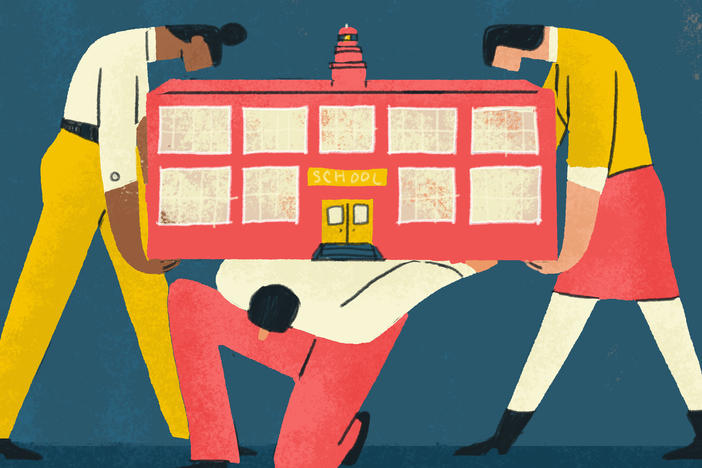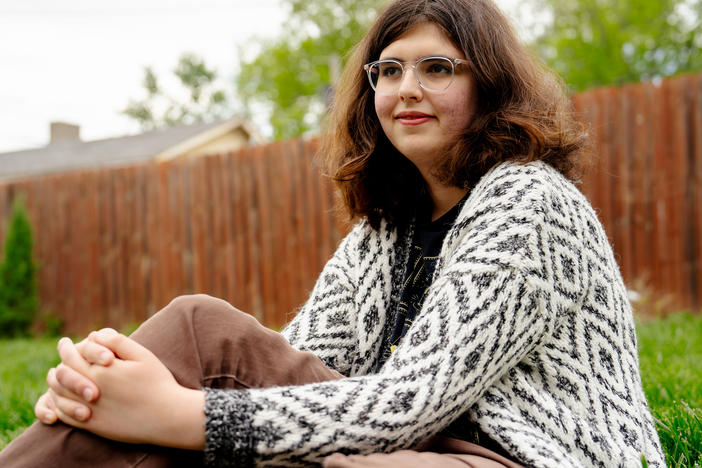Section Branding
Header Content
School board elections will be an early test of what issues motivate voters
Primary Content
This year, typically sleepy school board elections have become fraught with fights over masks, vaccines and diversity curricula. Could this affect races higher up the ballot in 2022 and 2024?
Transcript
SCOTT DETROW, HOST:
School board meetings used to be pretty uneventful, but all over the country, they are increasingly becoming angry and contentious political battlefields. Fights are breaking out over masks and COVID vaccines, as well as parents concerned about adding more diversity into the curriculum. And that means school board elections this fall will provide an early test of whether all of the outrage will actually motivate voters. NPR White House correspondent Tamara Keith joins us now. Good morning, Tam.
TAMARA KEITH, BYLINE: Good morning, Scott.
DETROW: So you and I cover politics. We both keep thinking culture wars and confrontational politics have peaked or bottomed out, and we keep being wrong. We're talking about school boards.
KEITH: Yeah. We are talking about school boards. National issues have crept into even the most local of races, typically nonpartisan races. And, you know, certainly there have been flare-ups in the past around schools, segregation, prayer in school, sex education. But what's happening now is widespread and it is intense. And Republican politicians see opportunity here. Just one example - the Republican candidate for governor in Virginia has made these school fights a centerpiece of his campaign.
DETROW: So you decided to focus in on how this is playing out in one school board race. Where'd you go?
KEITH: I went to Centerville, Ohio. It's a suburb of Dayton where people move for the high-quality schools and the small-town feel. So in a lot of ways, it's pretty typical. But this November, residents will vote in a school board race that is turning neighbors against each other in a way that they say even the 2020 presidential election did not. And it all goes back to last spring.
(SOUNDBITE OF KNOCKING)
UNIDENTIFIED PERSON: Good evening, everyone. Thank you for being here tonight, each and every one of you.
KEITH: Normally, only a handful of people would show up to a school board meeting like this, but in late April, there were dozens, many defying a requirement to wear masks.
LYSA KOSINS: Hi, my name is Lysa Kosins. I'm a parent of two children ages 8 and 10 that used to attend Centerville.
KEITH: Kosins told the board she pulled her kids out of the school district because she didn't want them to have to wear masks.
KOSINS: They complain to me every day how they don't want to wear it, how they don't want to go to school.
KEITH: She spoke for 10 minutes about how terrible masks are, and people cheered. Heather Schultz spoke next, ending her remarks with a warning.
HEATHER SCHULTZ: If you continue to ignore the families speaking out against this and other related topics, the people who elected you will replace you with people who support our ideals and goals because we are no longer asleep at the wheel.
KEITH: Moments later, the board voted to adjourn the meeting as it devolved into a shouting match. Kosins and Schultz are now running for the school board. A third candidate, Dawn McGuire, is also part of their slate, which aims to replace three current board members and effectively take over the five-member board. David Roer has served on the board for 28 years and is now fighting to keep his post.
DAVID ROER: The goal was to keep these kids in school, but the only way we saw keeping these kids in the classroom five days a week was to use the masks.
KEITH: He stands by that position, but it hasn't been easy. He says he's been harassed on Facebook. And one night, Roer says someone even came to his house.
ROER: On a Saturday night in the dark, starts ringing the doorbell, starts yelling and screaming at us, you're what makes America bad. I had to call the police.
KEITH: His colleague on the board, Megan Murray Sparks, says she's afraid of how intense it has all gotten. At a meeting in late August, there was more outrage about masks.
MEGAN MURRAY SPARKS: Every entrance, we had security. They had a safe room that they were going to put us in that they had planned out if anything was to happen. I was so scared before the meeting, I was physically in the bathroom texting my priest.
KEITH: The challengers say they don't condone violence or threats and are shocked at how heated the race has become. Schultz says they felt like they had to run because the current school board wasn't listening.
SCHULTZ: We absolutely respect a parent's right to put a mask on their child or not. If you want to send your kid in a mask or if you want to have them get any vaccine of any kind, that is absolutely your decision. And as a board member, we will not make those decisions for you. We will respect yours.
KEITH: And they also oppose diversity education that they say pushes racial discrimination in the name of anti-racism. It's another flashpoint in the culture wars of the moment.
DETROW: I mean, the safe room plans especially. I mean - but in terms of how this plays out in next month's elections, how did - what will that tell us about the upcoming congressional midterms and down-the-line national politics?
KEITH: You know, the outcomes in these races will give us a sense, we think, of whether there's a real uprising among parents or whether there's a lot of noise coming from a vocal minority. And Republicans who lost a lot of ground in the suburbs over the past eight years are hoping that schools could prove a winning issue for them. But Christine Matthews isn't convinced. She's a Republican pollster who spends a lot of time doing focus groups with suburban women.
CHRISTINE MATTHEWS: This is not something that's going to bring a swing suburban mom into the fold. In fact, what swing women tell me that they hate almost more than anything right now is the division between people in our country, the fights.
KEITH: So this will be a motivator for Republicans. But she says there could be also a backlash to all the chaos. In fact, I met with a group of moms in Centerville who mostly hadn't been involved with politics before and are all very upset by this. Bonnie Smith is one of them.
BONNIE SMITH: We are a top performing district. We're a reasonable community. And to create this friction and this chaos is inappropriate and personal.
KEITH: And now they are working to get the incumbents re-elected. Unlike presidential elections, they know the people. This is personal.
DETROW: Yeah. NPR White House correspondent Tamara Keith. Tam, it is good to hear you back out on the road.
KEITH: Good to be back out on the road. Transcript provided by NPR, Copyright NPR.
Bottom Content



